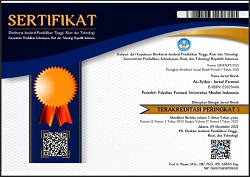PENGEMBANGAN TARGET TERAPI PADA HEPATITIS C
Abstract
For the development of new, specific anti-HCV drugs, an understanding of the HCV life cycle in particular the genomic organization and polyprotein processing, is essential. It has resulted in the development of several agents that target specific stages of the life cycle, the so-called specifically targeted antiviral therapy for HCV (STAT-C) drugs. Potential processes for viral inhibition include virus entry into the host cell, proteolytic processing, RNA replication, and the assembly and release of the new virions. Among the most promising new agents in development are the protease and polymerase inhibitors, as discussed below. RNA-targeted therapies, such as antisense oligonucleotides, ribozymes and small interfering RNA (siRNA)-targeting structures, have shown substantial success at inhibiting the HCV life cycle in vitro, but not in vivo. The structural viral envelope proteins E1 and E2, as well as their assembly, represent other potentialantiviral targets. Analogous to a recently developed HIV cell fusion inhibitor, detailed understanding of HCV cell fusion and cell entry could permit the development of specific HCV entry inhibitors.
Key Word : HCV, Antiviral, Target Specific
DOI: https://doi.org/10.56711/jifa.v1i2.102
Refbacks
- There are currently no refbacks.
Indexed by:
ISSN: 2085-4714 | e-ISSN: 2502-9444
Editor's Address:
Faculty of Pharmacy, Univeristas Muslim Indonesia
2nd Campus of UMI: Jl. Urip Sumoharjo km. 5 , Makassar, South Sulawesi, Indonesia
E-mail: jurnal.farmasi@umi.ac.id














